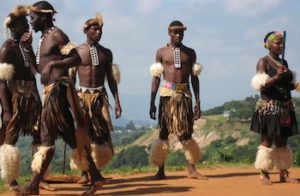
*This date celebrates the Zulu nation. The Zulu are the largest indigenous ethnic group in South Africa, with approximately 8 million people.
The Zulu is among many southern black African peoples belonging to the broader Nguni linguistic group. Like other Nguni groups such as the Xhosa, the Zulu speak a Bantu language, and their ancestors are believed to have migrated into southern Africa sometime after the 2nd century C.E. They settled in village communities, cultivated grains such as millet, and kept cattle, which became an important symbol of wealth. Also, like other Nguni groups, the Zulu developed a distinct language well before they forged a collective identity or a centralized political structure. These did not emerge until the late 18th century, when competition for grazing lands and access to sources of ivory, an important trade commodity, fostered conflict among Nguni clans.
At that time, only members of one Nguni clan identified themselves as Zulu, the name of one of the clan's founding ancestors. But not long after Shaka became the clan chief in 1816, the Zulu began a campaign of conquest and expansion known as the Mfecane, which led to the incorporation of many other peoples. Shaka, a brilliant military leader, built an army of more than 40,000 rigorously trained soldiers. Shaka also introduced several critical military innovations, such as the short stabbing spear, which gave Zulu troops a distinct advantage over their adversaries.
In only ten years, Shaka had built a kingdom, Zululand, encompassing most of the area now known as Natal Province. Shaka claimed absolute authority over his kingdom. Subsequent Zulu rulers retained his hierarchical leadership style and later adopted it by Inkatha, a 20th-century Zulu political organization. In conquered territories, Shaka appointed his officials; any subjects who refused overrule could be killed immediately. In addition, conquered peoples were expected to serve in the Zulu army, herd the king's cattle, and hunt elephants for ivory. Shaka strengthened his authority by conducting frequent cattle raids on neighboring groups like the Mpondo. A portion of the cattle was distributed to Shaka's chiefs and army officers to encourage loyalty.
Despite these tactics, however, Shaka faced internal opposition, and in 1828, his half-brother Dingane assassinated him. But Dingane lacked Shaka's military acumen and fared poorly in battles against the expansionist Afrikaners (also known as Boers). Although the Zulu lost land to the Afrikaners during the mid-19th century, they did not fall under European colonial rule until 1883, when British troops invaded Zululand. As part of Great Britain's Natal Colony, Zululand was divided into 13 chiefdoms, and the Zulu king Dinuzulu was exiled. Missionaries encouraged the Zulu to forsake practices of ancestor worship in favor of Christianity. Zulu farmers initially profited from strong markets for maize in Durban and other rapidly growing cities, but government policies eventually alienated most Zulu farmland.
Zulu men were consequently forced to migrate for wage labor, typically in the gold mines or sugar plantations. After the National Party came to power in South Africa in 1948, its system of apartheid assigned all the country's Africans to one of ten ethnic homelands (also known as Bantustans). The Zulu homeland was called KwaZulu and ruled by nominally independent "tribal" authorities. In 1976, Mangosuthu Gatsha Buthelezi became the chief minister of KwaZulu. He began encouraging Zulu nationalism through the revived Inkatha Ya Ka Zulu, a cultural organization founded in 1928.
Soon, a 19th-century Zulu king Cetshwayo descendant, Buthelezi, spoke out against apartheid. Still, his ethnic separatism and willingness to collaborate with the white-ruled South African government soon put him and Inkatha's Zulu membership at odds with antiapartheid groups such as the African National Congress (ANC). During the 1980s and early 1990s, the rivalry between the two groups often turned violent. (In 1998, South Africa's Truth and Reconciliation Commission issued a report concluding that much of this violence had been directed and organized by the white minority government to suppress the antiapartheid movement.)
After Inkatha became an official political party in 1990 (the Inkatha Freedom Party, or IFP), it joined with far-right Afrikaner organizations to oppose democratic negotiations led by the ANC and the National Party, and Buthelezi pressed for a separate Zulu state. After Nelson Mandela was elected president of post-apartheid South Africa in 1994, the IFP pulled out of the South African Constitutional Assembly to protest the ANC government; this has remained true since Thabo Mbeki took over.
Associations between the two parties remain contentious. In the former Zulu homeland, however, organizations such as the KwaZulu-Natal Arts and Culture Council encourage "nonpartisan" forms of Zulu nationalism. In October 2022, the South African government officially recognized Misuzulu kaZwelithini as the AmaZulu King.